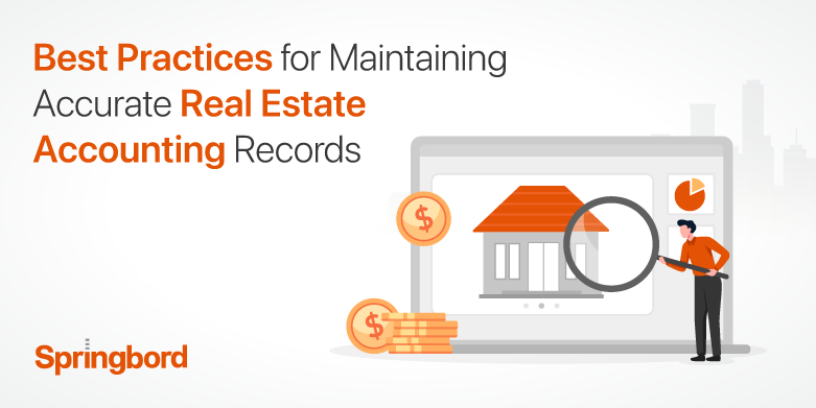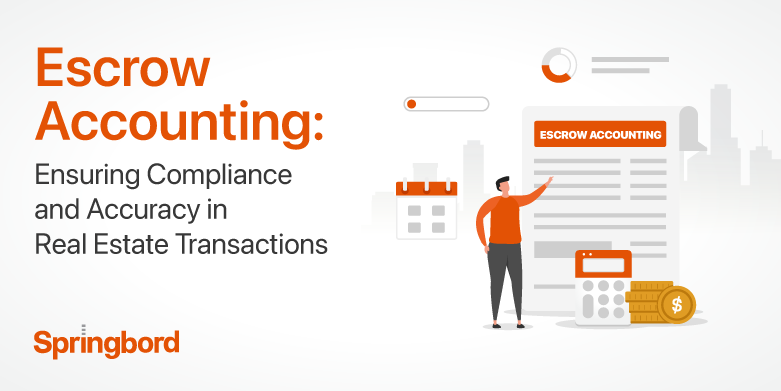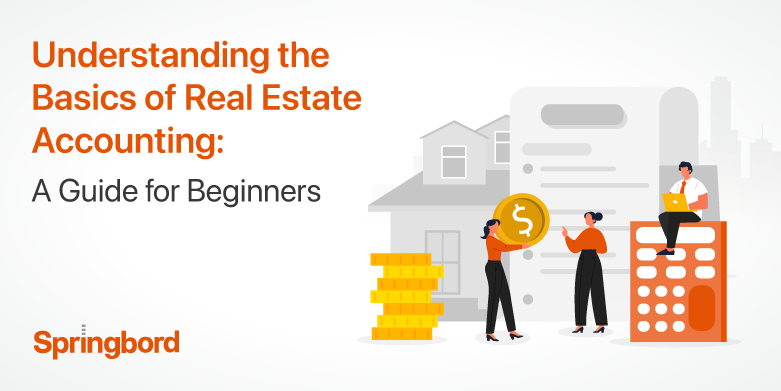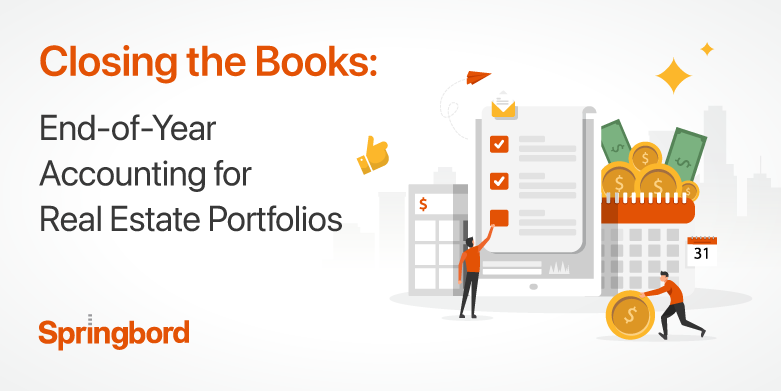 Read time 6 min
Read time 6 minIntroduction: The Critical Role of Accurate Accounting in Real Estate
In the dynamic world of real estate, the precision of accounting practices stands as a cornerstone for success. Accurate real estate accounting services is not just about keeping financial records in order; it’s about ensuring compliance with regulations, enabling strategic decision-making, and safeguarding the financial health of businesses. For real estate entities, from small agencies to large investment trusts, the complexities of transactions, leases, and property management demand meticulous financial tracking and analysis.
Amid these intricacies, Springbord emerges as a pivotal ally to real estate businesses striving for accounting accuracy. With a commitment to excellence, Springbord offers expert services and technology solutions designed to streamline accounting processes, enhance accuracy, and drive strategic growth.
Through specialized real estate services such as lease administration, property accounting, and CAM reconciliation, Springbord ensures that real estate businesses can focus on their core operations while leaving the critical task of accurate accounting in capable hands.
Establishing a Robust Accounting Foundation
Designing a Real Estate-Specific Chart of Accounts
Creating a tailored chart of accounts is fundamental for real estate businesses to capture all necessary financial activities with precision.
This chart should be designed to reflect the unique aspects of real estate operations, categorizing revenues, expenses, assets, and liabilities in a manner that facilitates detailed reporting and analysis.
The goal is to ensure that every financial transaction is accounted for in a way that aligns with industry standards and business needs.
Implementing Effective Internal Controls
To safeguard against errors and fraud, real estate businesses must implement robust internal controls. Strategies such as the segregation of duties, routine audits, and the use of automated accounting systems play a crucial role in preventing discrepancies and ensuring the integrity of financial records.
By establishing a strong framework of internal controls, businesses can enhance their financial oversight and protect their assets from potential risks.
Advanced Recording Techniques
Streamlining Expense Tracking
In the field of real estate accounting, accurately categorizing and recording expenses is paramount. Distinguishing between operating expenses and capital expenditures is essential for correct financial reporting and tax preparation.
Best practices involve the use of detailed accounts within the chart of accounts and leveraging accounting software to automate expense tracking and categorization, thereby enhancing accuracy and efficiency.
Managing Lease Accounting
Lease accounting poses unique challenges, requiring meticulous attention to detail to handle tenant leases accurately. This includes accounting for lease incentives, improvements, terminations, and understanding the implications of these for financial statements.
Springbord’s expertise in lease administration services encompasses a comprehensive approach to managing leases, ensuring compliance, and optimizing lease terms for financial performance. With experience in handling over 50,000 leases worldwide, Springbord brings a high degree of financial acumen and technical competence to the table, offering services that range from lease abstraction and due diligence to CAM reconciliation and lease audit services.
Leveraging Technology for Accuracy and Efficiency
In the fast-paced real estate sector, leveraging technology is not just an option; it’s a necessity for ensuring accuracy and efficiency in accounting practices.
The advancement of specialized software solutions has revolutionized how real estate businesses manage their finances, offering tools that cater specifically to the industry’s unique needs.
Selecting the Right Real Estate Accounting Software
When it comes to choosing real estate accounting software, the key lies in identifying solutions that are tailor-made for the complexities of real estate transactions. Features to look for include:
- Integration Capabilities: The ability to seamlessly integrate with property management systems, CRM platforms, and other essential business tools.
- Comprehensive Reporting: Advanced reporting features that allow for the analysis of property performance, investment returns, and other critical financial metrics.
- Scalability: Software that grows with your business, accommodating new properties, transactions, and evolving business models.
- User-Friendly Interface: An intuitive design that reduces the learning curve and enhances productivity.
- Cloud-Based Technology: Offers real-time access to financial data from anywhere, facilitating remote work and collaboration.
Selecting software that aligns with these criteria can significantly enhance the accuracy and efficiency of accounting processes, providing real estate businesses with a robust foundation for financial management.
Embracing Automation and System Integration
The integration of accounting software with property management systems marks a leap towards minimizing errors and streamlining workflows. Automation plays a pivotal role in this integration, transforming tasks such as rent collection, expense tracking, and lease management from manual to automated processes.
This not only reduces the risk of human error but also frees up valuable time for strategic planning and business development. System integration ensures that all financial data is synchronized across platforms, providing a unified view of financial health and making it easier to generate accurate and comprehensive reports.
Reconciliation and Reporting Best Practices
Ensuring Regular Account Reconciliation
Regular account reconciliation is a non-negotiable practice in real estate accounting. Monthly bank reconciliations and checks on other accounts are essential to detect and correct discrepancies early.
This practice ensures that the financial records accurately reflect the business’s cash position and transactions, safeguarding against fraud and errors. Regular reconciliation also aids in maintaining compliance with financial reporting standards and prepares the business for a smoother audit process.
Advanced Financial Reporting
The ability to generate advanced financial reports is crucial for deep diving into property performance, cash flow, and overall profitability. Best practices in financial reporting involve:
- Segmentation: Breaking down data by property, region, or business unit to identify performance trends and areas for improvement.
- Cash Flow Analysis: Detailed reports on cash inflows and outflows, providing insights into liquidity and financial health.
- Investment Performance: Evaluating the returns on investment for each property or portfolio, aiding in strategic decision-making.
By adopting these reporting techniques, real estate businesses can gain a clearer understanding of their financial standings, make informed decisions, and strategically guide their operations towards sustained growth and profitability.
Navigating Compliance and Taxation with Precision
Adapting to Regulatory Changes
Keeping abreast of changes in real estate accounting standards and regulations is essential for maintaining compliance. This includes understanding updates in lease accounting standards, property valuation methods, and reporting requirements.
Real estate businesses must ensure that their accounting practices are aligned with the latest guidelines set by regulatory bodies such as the Financial Accounting Standards Board (FASB) and the International Financial Reporting Standards (IFRS). Regular training for finance and accounting teams, coupled with the implementation of accounting systems that are updated in real-time with regulatory changes, can help businesses stay compliant.
Strategic Tax Recordkeeping
Effective tax strategy planning and compliance in real estate require maintaining detailed and accurate records. Given the specific tax considerations in real estate, such as depreciation, capital gains, and the treatment of rental income, meticulous recordkeeping is vital.
These records not only support strategic tax planning but also ensure readiness for audits and compliance checks. Implementing automated recordkeeping systems that can accurately track and categorize transactions according to tax requirements is crucial for minimizing liabilities and maximizing returns.
Springbord’s Expertise in Enhancing Accounting Accuracy
Springbord stands at the forefront of addressing the accounting needs of the real estate industry with tailored solutions that ensure accuracy and compliance.
Tailored Accounting Solutions
Springbord understands that each real estate business has unique accounting needs. Whether it’s managing complex lease agreements, navigating property acquisitions and dispositions, or ensuring compliance with ever-changing regulations, Springbord customizes its accounting solutions to meet these specific requirements.
By combining industry expertise with a deep understanding of real estate accounting challenges, Springbord delivers solutions that not only enhance accuracy but also ensure regulatory compliance.
Innovative Approaches and Technologies
Springbord employs advanced methodologies and technologies to address the specific challenges faced by real estate accountants and financial managers.
This includes leveraging cloud-based accounting software, implementing automation for routine tasks, and utilizing data analytics for deeper financial insights. Springbord’s innovative approaches streamline accounting processes, reduce errors, and provide real-time access to financial data, enabling strategic decision-making and operational efficiency.
Conclusion: Elevating Accounting Standards with Springbord
Accurate accounting records are not just a regulatory requirement in the real estate industry; they are a cornerstone of business success.
We enable strategic decision-making, ensure compliance, and safeguard the financial health of the business. Partnering with Springbord elevates accounting standards by providing expert solutions tailored to the unique needs of real estate businesses.
Springbord’s commitment to accuracy, compliance, and innovation in accounting practices ensures that real estate businesses can navigate the complexities of the industry with confidence. By leveraging Springbord’s expertise, businesses can achieve a level of financial clarity and efficiency that drives growth and profitability.
We encourage real estate businesses to explore Springbord’s solutions further and discover how we can enhance your accounting practices.
Get in touch with us today to learn how we can help you elevate your accounting processes and drive business success.







